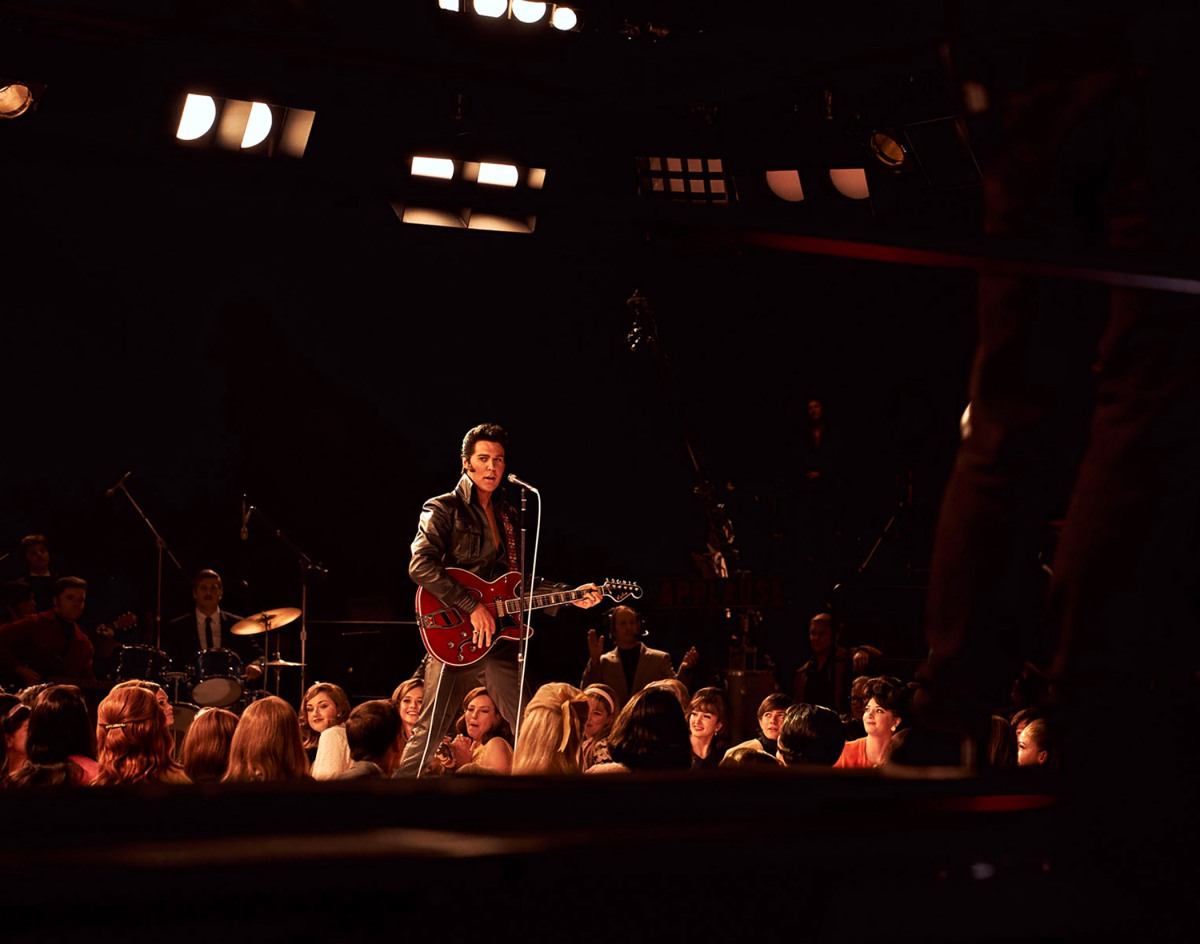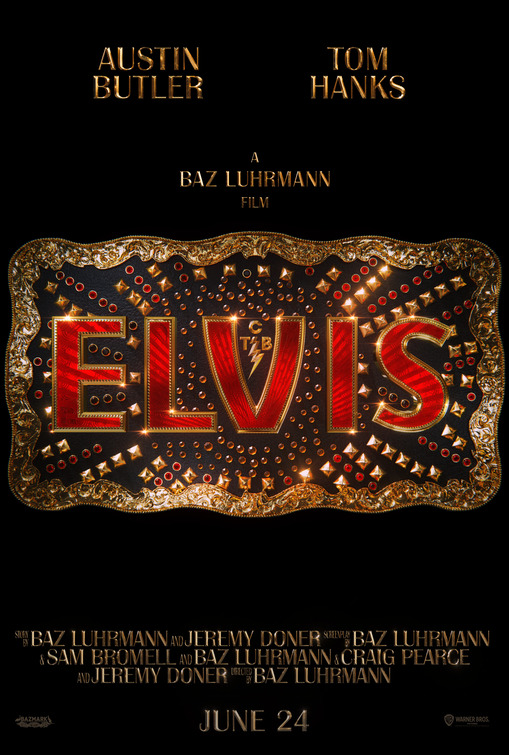How Warner Bros. has sold a flashy non-biopic
If you’re familiar with the work of director Baz Luhrmann you probably know largely what can be expected from this week’s ELVIS, new in theaters. Luhrmann directs a screenplay from himself and others telling the story of rock and roll legend Elvis Presley. Austin Butler plays Presley as the action moves from his first forays into public performance through the years of super-stardom and more. Through much of that he’s managed/coached by Col. Tom Parker (Tom Hanks, under a metric ton of prosthetics and makeup).
It’s a simple enough setup, though in the hands of a unique filmmaker like Luhrmann you can be assured there will be plenty of flashy, unconventional stylistic choices being made. The movie also stars Helen Thomson, Richard Roxburgh, Olivia DeJonge and others as the people in Presley’s life, both personal and professional.
With one of the biggest names in all of popular music history as the subject matter, the marketing should be a no-brainer, so let’s take a look at some of the decisions the studio made while selling it to the public.
announcement and casting
The movie was oddly flying under the radar until March of 2020, when production in Australia was halted after Hanks tested positive for Covid-19.
In January WB announced a delay in release.
Hanks talked about the movie and his character briefly while promoting other projects last year. Harrison Jr. also briefly commented on the movie in mid-2021 while on the publicity tour for Monster.
Warner Bros. gave CineEurope attendees a look at the movie in October 2021.
Luhrmann teased a bit of footage from the film in November of that year to make sure audiences knew he was still working on it and was trying to do the subject matter justice.
the marketing campaign phase one: a rock star is born
The first trailer (17.2m YouTube views) was released in February of this year following a tease by Luhrmann. Narrated by The Colonel, it opens with a young Elvis sneaking into a tent revival where he’s overtaken by the sound of the music and the feeling it creates. Fast forward several years and Elvis is on stage, making girls go crazy with the sound of his voice and the shake of his hips. From there on out it’s a montage of clips from throughout Elvis’ career, including his ups and downs and even a few acknowledgements of where he stood in the middle of racial upheaval in that time. But it’s mostly about the flashing camera lights, the music and other spectacle.
At the same time the first poster came out, similarly setting the visual tone for the campaign with what looks like a rhinestone belt buckle as the title treatment.
In early April Warner Bros. confirmed the movie would premiere at Cannes in May. Later that month exhibitors and others got a look at the movie when it was part of the studio’s presentation at CinemaCon.
Luhrmann posted a video in mid-April talking about the music of the movie and offering a brief preview of “Vegas” by Doja Cat, with plans for the single to be released in full in early May. It was also revealed Kacy Musgraves was covering “Can’t Help Falling In Love.”
Butler, Luhrmann and others from the cast and crew were joined by Priscilla Presley at the Met Gala, everyone in their highest of fashion as the event offered a perfect venue for a movie with visuals like this. Musgraves also performed “Can’t Help…” here.
Priscilla Presley debuted an exclusive clip showing Elvis getting all the women in the audience worked up with his wiggle in early May.
A profile of Luhrmann had the director explaining why he felt moved to make this project and why it is not, and was never intended to be, a traditional biopic in structure. Butler was given a similar profile a short while later that centered on this being a star-making moment for the actor.
the marketing campaign phase two: family approval
Another positive endorsement for the movie came from Riley Keough, Elvis’ granddaughter, who not only praised the filmmaking and the story but said that watching it with her mother and grandmother had them all crying at seeing their family’s story on screen. She also said she hadn’t been interested in being part of the film since it was a little too close for her comfort.
Three new posters came out in mid-May, all of them featuring Elvis in different phases of his career, from the rockabilly sideburns to the black leather jacket to the white suit.
The second trailer (9.2m YouTube views) came out at the end of May. It opens with Elvis defying police orders to not be suggestive in his movements during a concert, of course leading to a confrontation with those officers but beginning the mythologizing of his persona. The focus here is on Elvis’ rebellious nature, which is presented as coming from a place of believing (and being told by others) that his gift is one that comes from God and that he’d be wrong to deny or hide it. Aside from that it sells the usual Luhrmann glitz and spectacle, which is the real point here.
A screening at the Cannes Film Festival cemented the positive word of mouth that had already been circulating, helped by a reported 12-minute standing ovation as the film ended. Another profile of Butler published in that period had him talking about how his body started shutting down after filming finished and how a call to Luhrmann from Denzel Washington helped him secure the role. The director also spoke about the racial elements not only of the film’s story but Elvis’ life, which he tried to put in context.
Costar Alton Mason, who plays Little Richard, was profiled about how he got into character and what it was like to work with Luhrmann.
Warner Bros. and British GQ hosted a special screening of the film in London where the cast and crew participated in a Q&A.
the marketing campaign phase three: the music
Warner Bros. released a tease of Musgraves singing “Can’t Help Falling In Love With You” as the attention turned back to the music, including a performance by Diplo and Swae Lee of “Tupelo Shuffle” at the MTV Movie & TV Awards.
Butler and Luhrmann both talk about the challenges of taking on such lofty subject matter in a featurette that focused on the research and prep work they both did.
A red carpet premiere event was held in Australia in early June, a natural given Luhrmann and much of the cast hails from there. That was followed by a special screening of the film held at Graceland in mid-June with the director, stars and Presley family in attendance, another sign of the family’s endorsement of the film.
An exclusive poster from Dolby Cinemas came out at this time.
In an interview, Luhrmann revealed Harry Styles campaigned extensively for the title role but that the director was too worried Styles’ existing persona would overwhelm the character.
To help sell how Butler did his own singing in the movie Luhrmann released a video of pre-production test footage showing the actor singing and performing along with a small band.
Butler and Hanks both appeared on “GMA” to talk about the movie and Hanks received his own profile about working with Luhrmann and how things are going in his career and life in general. Butler later stopped by “The Tonight Show”.
Another special screening was held in New York City and once again was sponsored by Vogue.
That was followed by a featurette on the fashions and costume design of the film. Another had Luhrmann talking with a member of the group BLACKPINK about how she was inspired by Elvis and more.
Additional media appearances by the cast included Hanks on “The Late Show,” Olivia DeJonge (with Priscilla Presley) on “GMA,” Butler (again with Priscilla) on “20/20” and lots more.
Luhrmann and others appeared in an exclusive AMC Theaters interview video.
The Canadian premiere of the film was held last week in Toronto with DeJonge, Butler and Luhrmann in attendance.
The Presley family joined the cast and Luhrmann at the TCL Chinese Theater for a “Handprint and Footprint” ceremony.
One final trailer was released just today exclusively by Fandango MovieClips. It features a bit of new footage and a slightly different take on some story elements but fits largely with what has been seen so far. It also includes some of the praise from members of the Presley family to let audiences know this has been officially endorsed by them.
overall
As of now the movie is projected to bring in around $35 million in its first weekend, which isn’t at the same level some other recent high profile releases have grossed. Maybe that’s because this isn’t a super hero sequel, even though it’s about an artist dubbed The King for much of his career and who’s been recognized as the best-selling solo musical artist of all time.
So maybe the campaign just can’t make up the difference in generating audience interest despite Warner Bros. hanging the marketing on a few key elements:
- Making a star out of Butler: He’s been positioned as a breakout here, someone who lost himself in becoming Presley for the camera. There have been countless profiles and other accolades for Butler, who is the lynchpin of the effort here.
- Translating the music for a new generation: Instead of trying to sell people the Elvis originals of his recordings, the focus here has been on the more current artists that are reinterpreting and livening up those classics in a way that’s apparently meant to be palatable for younger listeners. Many of those artists have also been in attendance at various premieres and other events to help hammer home how integral they are to the finished film.
- The Presley Family seal of approval: The studio and filmmakers want everyone to know this isn’t a hit job or critical look at the star (thought it might be less kind to Parker) and so the praise from three generations of Presley women has been used extensively in the last half of the campaign.
On top of all that I have a few questions/issues:
First: What’s the connection with Vogue that seems to be laced throughout the campaign? The publication hosted multiple events and published multiple profiles of Butler and others in the cast. It’s so constant and pervasive there has to be some kind of deal in place, but it’s never called out or acknowledged.
Second: Look at most all of the posters, trailers and other material and you’ll see “TCB” emblazoned on them, a reference to the name given to Elvis’ backing band in the 1970s. But that band is almost entirely absent from the trailers and isn’t called out in any way in other promotions. Not only that, there’s nothing about the campaign that uses “Taking care of business” as a slogan or tagline, so it’s a weird stylistic choice here.
It’s an intriguing campaign that sells Luhrmann’s vision very well and repeatedly hits a few key points but has a hard time otherwise resonating.


